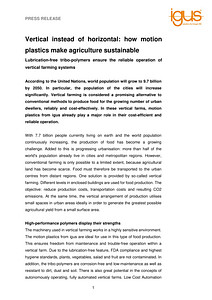Vertical instead of horizontal: how motion plastics make agriculture sustainable
October 17, 2019
Lubrication-free tribo-polymers ensure the reliable operation of vertical farming systems

According to the United Nations, world population will grow to 9.7 billion by 2050. In particular, the population of the cities will increase significantly. Vertical farming is considered a promising alternative to conventional methods to produce food for the growing number of urban dwellers, reliably and cost-effectively. In these vertical farms, motion plastics from igus already play a major role in their cost-efficient and reliable operation.
With 7.7 billion people currently living on earth and the world population continuously increasing, the production of food has become a growing challenge. Added to this is progressing urbanisation: more than half of the world’s population already live in cities and metropolitan regions. However, conventional farming is only possible to a limited extent, because agricultural land has become scarce. Food must therefore be transported to the urban centres from distant regions. One solution is provided by so-called vertical farming. Different levels in enclosed buildings are used for food production. The objective: reduce production costs, transportation costs and resulting CO2 emissions. At the same time, the vertical arrangement of production utilises small spaces in urban areas ideally in order to generate the greatest possible agricultural yield from a small surface area.
High-performance polymers display their strengths
The machinery used in vertical farming works in a highly sensitive environment. The motion plastics from igus are ideal for use in this type of food production. This ensures freedom from maintenance and trouble-free operation within a vertical farm. Due to the lubrication-free feature, FDA compliance and highest hygiene standards, plants, vegetables, salad and fruit are not contaminated. In addition, the tribo-polymers are corrosion-free and low-maintenance as well as resistant to dirt, dust and soil. There is also great potential in the concepts of autonomously operating, fully automated vertical farms. Low Cost Automation systems enable cost-effective vertical planting, harvesting or packaging throughout the year, along with a quick return on investment.
Vertical farming is no longer a dream of the future
Living Greens Farm is exemplary for its vertical farms. The idea of the US company is to convert vacant skyscrapers into vertically arranged farms. These cultivation techniques require special machinery for nutrient supply and irrigation of the plants. A patented traverse system equipped with igus e-chains carries enriched water directly to the plant roots. In an empty warehouse in Minneapolis, about 4,000 square metres of space is used in this way to yield the same quantity of food produced from more than 40 hectares of conventional agriculture. Intelligent Growth Solutions (IGS) also uses igus motion plastics for automation in vertical farming. One of the goals of the company, Growth Towers, is to make vertical farming more economical by improving productivity, yield, quality and consistency and by drastically reducing electricity and labour costs. The vertically arranged IGS systems must be reliable, yet low-friction and easy to maintain. The drylin linear guide systems from igus meet all requirements and ensure trouble-free operation of the system. A year after installation of the lubrication-free components, no noticeable wear of the bearing shell could be detected at inspection.



